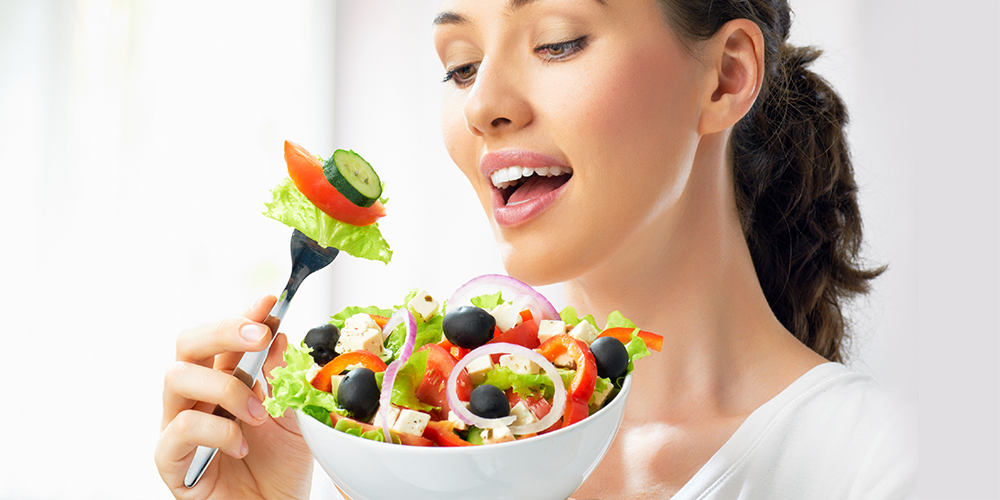Why Is It Important To Have Plenty Of Salads Daily?

HOW IMPORTANT IS IT TO ADD PLENTY OF SALAD TO YOUR DAILY DIET:
Salads add color and texture and make the meal attractive besides providing fiber and nutrients like minerals and vitamins. Salad can be had as a snack, a side dish, an accompaniment to a meal or even as the main dish.
Tomatoes, lettuce, onions, cucumber, cabbage, red cabbage, carrot, capsicum, radish and boiled or sprouted pulses and fruits like apple, pineapple, etc are generally used. Vegetables can be sliced or grated or cut into flowers or cubes. The addition of salt and pepper improve the taste. Salads can be raw or cooked. Salad dressings can be used to liven up the taste of a salad. Common dressings include lemon juice, vinegar, beaten curd, salad oil or mayonnaise. Salads are garnished with coriander leaves, dry fruits or nuts.
The above saying indicates that taking salad means taking a lot of fresh green foods, directly from nature. Thus taking salad every day may provide you the following advantages;
Salad contains the following;
- Vitamin-C: It is an antioxidant found in the blood and cytosol of cells, reduces the damage caused by free radicals during the oxidation process. Fresh fruits, lemon, fresh vegetables, leafy vegetables are chief sources of it.
- Vitamin E: It maintains the integrity of all membranes by preventing oxidation of polyunsaturated fatty acids. Besides reducing LDL oxidation as a result of its potent antioxidant properties, Vitamin E reduces platelet aggregation and thrombus formation. Intake of Vitamin-E from foods protects against nonfatal coronary heart disease. Dark green leafy vegetables, nuts, vegetable oils, whole grain cereals are the sources of vitamin-E here.
- Carotenoids and Beta-carotene: Beta-carotene is an antioxidant and quenches singlet oxygen and reacts directly with free radicals generated during lipid per oxidant and quenches singlet oxygen and reacts directly with free radicals generated during lipid peroxidation. Green leafy vegetables, yellow colored fruits, and vegetables are good sources of it.
- High fiber: Salad means a lot of fiber. Fibre reduces cholesterol.
- Pectin (apples, guavas) lowers the level of serum cholesterol and enhances the excretion of fecal steroids.
- Legumes, vegetables, and fruits can lower the level of serum cholesterol, but the effect is usually small compared with the well-known effect on HDL and serum triglycerides.
- Studies show that blood pressure can be reduced by using fiber-rich diets.
- Dietary fiber also reduces serum fibrinogen levels, which in turn lower the risk of blood clot formation and myocardial infarction.
- In many ways, dietary fiber also protects us from different cancer as well. It dilutes bile acids or binds to it thereby preventing its role in mutation or cell proliferation.
- Fermentation of dietary fiber results in the production of short chain fatty acids lowering the intestinal pH. This inhibits the conversion of primary bile acids to 2ndary.These 2ndary bile acids are believed to promote mutation in our intestine.
- Dietary fiber exerts its beneficial effect by speeding the passage of feces through the large intestine so that carcinogens are in contact with the intestinal wall for a much shorter period of time.
- Additionally, the bulk and water of the feces may dilute the carcinogen to a nontoxic level.
- Intake of salad helps to protect us from the occurrence of gastrointestinal disorders like constipation, bowel disease etc.
- Intake of salad in the daily diet reduces excessive sugar load as it slows the absorption of sugar from the diet.
Tips for making salad easy and tastier:
- Vegetables should be fresh and of good quality
- Knife should be sharp to cut into desirable shape
- Wash the vegetables thoroughly in running water
- Serve the salad immediately after preparation
- The presentation is an important aspect of salad making.









